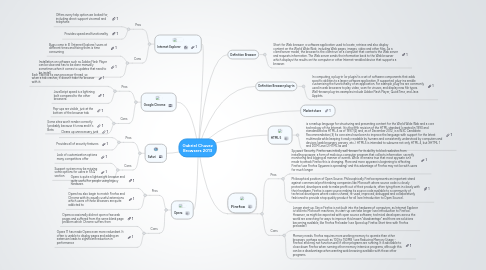
1. Google Chrome
1.1. Pros
1.1.1. Each Tab has its own processor thread, so when a tab crashes, it doesn't take the browser with it;
1.1.2. JavaScript speed is a lightning bolt compared to the other browsers;
1.2. Cons
1.2.1. Pop-ups are visible, just at the bottom of the browser tab;
1.2.2. Some sites won't render correctly (probably because it's new and it's Beta
2. Safari
2.1. Pros
2.1.1. Cleans up unnecessary junk
2.1.2. Provides all of security features
2.2. Cons
2.2.1. Lack of customization options many competitors offer
2.2.2. Support system may be missing some options for users in FAQ section
3. Internet Explorer
3.1. Pros
3.1.1. Offers every help option we looked for, including direct support via email and telephone
3.1.2. Provides speed and functionality
3.2. Cons
3.2.1. Bugs come in IE (Internet Explorer) users at different times and fixing them is time consuming
3.2.2. Installation on software such as Adobe Flash Player can be slow and has to be done manually sometimes when it comes to updates that need to be install
4. Opera
4.1. Pros
4.1.1. Opera is quite a lightweight browser and quite useful for people using legacy hardware.
4.1.2. Opera has also begin to match Firefox and Chrome with its equally useful extensions which users of these browsers are quite addicted to
4.2. Cons
4.2.1. Opera occasionally did not open a few web pages and suffered from the same blank page problem which Chrome suffers from
4.2.2. Opera 11 has made Opera even more redundant. It often is unable to display pages and adding an extension leads to significant reduction in performance
5. Definition Browser
5.1. Short for Web browser, a software application used to locate, retrieve and also display content on the World Wide Web, including Web pages, images, video and other files. As a client/server model, the browser is the client run on a computer that contacts the Web server and requests information. The Web server sends the information back to the Web browser which displays the results on the computer or other Internet-enabled device that supports a browser.
6. Definition Browser plug-in
6.1. In computing, a plug-in (or plugin) is a set of software components that adds specific abilities to a larger software application. If supported, plug-ins enable customizing the functionality of an application. For example, plug-ins are commonly used in web browsers to play video, scan for viruses, and display new file types. Well-known plug-ins examples include Adobe Flash Player, QuickTime, and Java Applets.
7. Market share
8. Firefox
8.1. Pros
8.1.1. Spyware Security. Firefox was initially well-known for its ability to block websites from installing spyware, a form of malicious computer program that collects information, secretly monitoring and logging all manner of events. While it remains true that most spyware isn't made to attack Firefox this is changing. More and more spyware is beginning to affecting Firefox (see Firefox Spyware is spreading) and this advantage of Firefox may not be with users for much longer
8.1.2. Philosophical position of Open Source. Philosophically Firefox represents an important stand against commercial profit making companies like Microsoft where source code is closely protected, developers seek to make profit out of their products, often tying them in closely with their hardware. Firefox is open source making its source code available to a community of technical developers where code is shared, re-used, improved, debugged and collaboratively fashioned to provide a top quality product for all (see Introduction to Open Source).
8.2. Cons
8.2.1. Longer start-up. Since Firefox is not built into the hardware of computers, as Internet Explorer is tied into Microsoft machines, its start-up can take longer (see Introduction to Firefox). However, as might be expected with open source software, technical developers across the world are searching for ways to improve this known "disadvantage" and there are solutions becoming available, like Firefox Preloader (see Speed up Firefox Start time with Firefox preloader).
8.2.2. Memory needs. Firefox requires more working memory to operate than other browsers, perhaps as much as 100 to 150MB, (see Reducing Memory Usage - Firefox) and may not function well if other programs are running. It is advisable to close down Firefox when running other memory intensive programs, although this can be a disadvantage when wanting web browsing available with these other programs.
